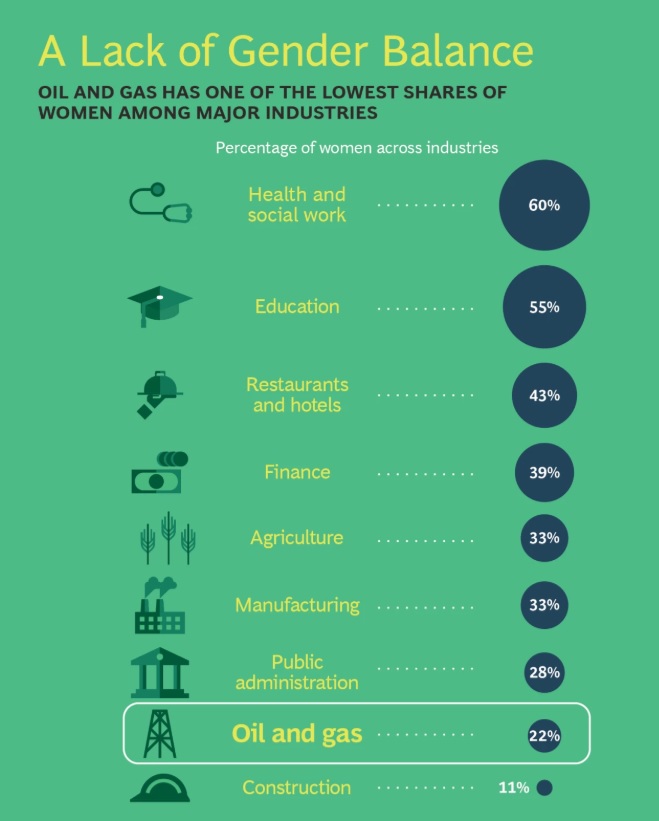In 2017, a report conducted by the World Petroleum Council and The Boston Consulting Group revealed that Oil and Gas (ONG) has one of the lowest shares of women among major industries. Here we are today, one year later, and there is still much to do. It’s not just about the industry’s attitude though, it’s also about breaking down society’s stereotypes and convincing candidates that this could be the right role for them.
Women account for 20% of engineering graduates, yet only 11% of the engineering workforce. –World Economic Forum
According to the report, not enough women enter the ONG mainly due to a shortage of women in STEM (science, technology, engineering, and mathematics) education programs, which provide the necessary qualifications for a career in the technical areas of the industry. Also, there is a poor reputation as a place for women to establish a career because of the common negative views prevailing in the sector.
However, women in ONG can be a game changer and drive inclusive growth. As well as in all sectors, gender balanced business units in offshore industry may show innovation and progress; better employee engagement; improved organizational performance; creativity in decision making and morale; better client retention and increased profits.
The ONG industry status at a glance
Women constitute 38% of the workforce in major oil-producing nations but only 22% of employees in oil and gas. Although men and women start out on an equal footing, women rarely reach the top of the organization; only 1% of the industry’s CEOs are female. 27% have entry-level roles that demand a college degree, 25% have mid- career-level roles, and 17% senior and executive-level roles. The percentage of women in the industry’s workforce drops over time and falls particularly sharply—from 25% to 17%—between the middle-management and senior-leadership career stages.
There are many actions the industry can take to increase the number of female employees and accelerate its progress toward gender balance.

How to encourage gender equality in ONG
Social perceptions even today lean to indicate that such jobs require skills more associated with men. Both families and society do not encourage women to choose a career in the ONG sector. The industry, at least, must engage with legislators to promote change in countries that limit women’s participation.
- Promote a wide range of available jobs
A range of roles could be available in the industry; jobs in engineering; in supply chain operations; in environmental management or geological research for example. Each ONG organization should have facilities and amenities to facilitate the dwelling of a women employee.
- Establish work-life-balance policies
It is of essence to bring awareness among prospective female workforce and to enhance policies supporting their welfare. Finding a balance between demands of work and family has been a common issue while social pressure and traditional social responsibility develops negative mind-set to the potential female employees. Society must have the common recognition of the importance of the utilization of the women work force.
- Ensure equal career opportunities
How many times have you heard the following statement: “You can’t be an engineer, this is a man’s job”? In year 2018, it is necessary to improve career awareness in the ONG sector and ensure that women have the same career opportunities as men both in technical and/or commercial careers. Absence of relevant educators and of organizations further contributes to the lack of stimulus for women.
- Encourage women at senior-leadership level
Lack of workplace support keeps women out of a career in ONG most of the times. Traditional hierarchal leadership styles in the industry must incorporate the new generation more into the decision-making process. This can be done through leadership development programs, to help mold them into skilled leaders at an early stage of their career.
All in all, in an age when we can be proud of gender equality, engineering and ONG continue to stand out as one of few remaining male-dominated industries. Greater gender balance is a worthwhile and attainable goal for the industry, and one that it has the means to achieve!
I like out-of-the-box thinking. Had I not followed my dreams when I was younger, I would have had a very different life. I couldn’t imagine living someone else’s idea of what my life should be. You need to be who you want to be. Forget about society’s stereotypes. – Marwa Al-Ansary Research and Development Technology Manager in Qatar Shell Research and Technology Center

- Shell has set a target of 50% women among the college graduates it hires.
- Chevron also has a 50% female recruitment target.
- OMV Group’s ‘Technikqueens educational initiative’ is designed to immerse girls aged 14 to 16 in technology and encourage them to choose a technical career path.
- ExxonMobil’s ‘Introduce a Girl to Engineering Day’ program seeks to inspire middle-school girls in the US to explore coursework and careers in engineering

































































